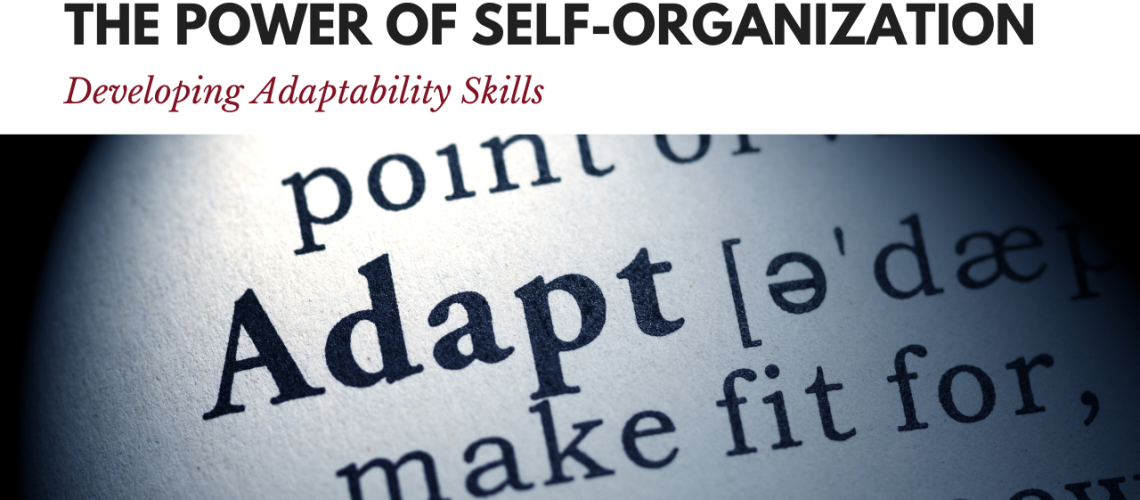By Dr. Salam Slim Saad
Self-organization is a powerful tool for unlocking your adaptability skills! Developing strong adaptability skills is essential for personal growth and success, whether you’re navigating unexpected challenges, juggling multiple responsibilities, or staying motivated in the face of adversity.

Self-organization not only helps you manage your time effectively but also boosts productivity, resilience, flexibility, problem-solving abilities, and stress management techniques – all while fostering a mindset of continuous learning. It’s like having a secret superpower that allows you to conquer any obstacle that comes your way!
Being able to adapt and thrive in any situation has become more crucial than ever before. Whether it’s navigating through unexpected challenges, juggling multiple responsibilities, or staying motivated in the face of adversity, developing strong adaptability skills is essential for personal growth and success.
Understanding Adaptability Skills
Adaptability skills are the secret weapons that help you navigate uncertain situations, embrace change, and thrive in dynamic environments. But what exactly does it mean to have adaptability?
Adaptability, at its core, is the ability to adjust and respond effectively to new circumstances or challenges. Explore the essential qualities and principles that define adaptability.

- Time Management and Prioritization: Being able to prioritize tasks efficiently allows individuals to allocate their resources wisely and stay productive even when faced with unexpected changes or deadlines.
- Flexibility and Open-Mindedness: Flexibility is also a vital component of adaptability skills. Adaptable individuals can adjust their plans easily and find alternative solutions when facing unforeseen circumstances or shifting priorities.
- Resilience and Emotional Intelligence: Resilient individuals possess strong emotional intelligence and can bounce back from setbacks quickly. They view failures as opportunities for growth rather than roadblocks.
- Problem-Solving and Creativity: Problem-solving capabilities go hand-in-hand with adaptability skills since they involve finding creative solutions during challenging times and overcoming obstacles effectively.
The Role of Self-Organization in Developing Adaptability
- Effective Time Management: It is about creating a solid framework for personal growth and development. By cultivating effective organizational habits such as prioritization, time management techniques like the Pomodoro method or Eisenhower matrix can be helpful), and continuous learning practices (such as reading books related to your professional field or attending online courses), we empower ourselves to navigate uncertainties with confidence and resilience.

- Prioritization and Focus: Prioritization and focus are fundamental aspects of self-organization. They form the cornerstone of effective time management and productivity. When we prioritize tasks based on their importance and urgency, we create a roadmap for our daily activities. By channeling our energy and attention into the most crucial tasks first, we maximize efficiency and ensure that essential goals are met. This deliberate focus on priorities helps us maintain clarity and direction, even in the face of distractions or shifting circumstances, ultimately enhancing our adaptability.
- Stress Reduction Through Organization: Organizing our tasks and responsibilities can be a powerful stress-reduction tool. When we break down complex projects into smaller, manageable steps and allocate time for each task, we eliminate the overwhelming feeling of having too much to handle. This structured approach not only enhances productivity but also reduces stress levels. By knowing exactly what needs to be done and having a clear plan in place, we can approach challenges with a calmer mindset. This reduction in stress allows us to adapt more effectively to unexpected situations and maintain our composure during times of change.
- Cultivating a Learning Mindset: Cultivating a learning mindset is essential for adaptability. When we embrace continuous learning practices, such as reading books related to our professional field or attending online courses, we equip ourselves with the knowledge and skills needed to adapt quickly in an ever-changing world. A learning mindset encourages us to seek out new information, challenge our existing beliefs, and stay open to innovative ideas. It fosters intellectual curiosity and resilience, enabling us to pivot and thrive in dynamic environments.
- Adaptability: Adaptability itself is a crucial aspect of self-organization. As we refine our self-organizational skills, we become better prepared to handle unexpected changes and shifting priorities. The ability to adjust our plans easily and find alternative solutions when facing unforeseen circumstances is a hallmark of adaptability. When we combine effective self-organization with adaptability, we create a potent synergy that empowers us to navigate uncertainties with confidence and resilience. This dynamic combination allows us to not only react but proactively shape our responses to various challenges, ultimately leading to personal growth and success.
Tips for Improving Self-Organization and Adaptability

- Prioritize and Plan: Effective self-organization starts with setting clear priorities. Take the time to identify your goals, break them down into smaller tasks, and create a schedule or to-do list. This will help you stay focused and make progress towards your objectives.
- Develop Time Management Skills: Time management is crucial for self-organization. Set deadlines for yourself, allocate specific blocks of time for different activities and eliminate distractions that can derail your productivity.
- Cultivate Resilience: Building resilience is essential in developing adaptability skills. Embrace challenges as opportunities for growth rather than obstacles to overcome. Learn from setbacks, bounce back quickly, and maintain a positive mindset throughout the process.
- Enhance Problem-Solving Abilities: Strengthening problem-solving skills fosters adaptability by enabling you to think critically and find creative solutions when faced with unexpected situations or changes in circumstances.
- Practice Stress Management Techniques: Stress can impede both self-organization and adaptability. Incorporate stress management techniques such as exercise, mindfulness meditation, or deep breathing exercises into your daily routine to reduce anxiety levels and enhance focus.
- Foster Continuous Learning: Adaptability requires a willingness to learn new things constantly.
Navigating Challenges in Self-Organization
Self-organization is a valuable skill that can significantly boost both our adaptability and productivity. However, the journey to mastering self-organization is not without its share of obstacles. In this section, we will explore common challenges and effective strategies to overcome them.
Challenge 1: Time Management: Balancing multiple tasks and responsibilities can lead to feeling overwhelmed and losing focus. The Solution to this challenge involves Prioritizing tasks based on importance and urgency. Break down large projects into manageable steps with clear deadlines.
Challenge 2: Maintaining Motivation and Discipline: Staying motivated and disciplined can be difficult, leading to demotivation or distractions; the Solution to this challenge involves Developing resilience by reigniting your passion for your tasks. Visualize your end goals and seek support from peers or mentors.
Challenge 3: Embracing Flexibility: Unexpected changes or disruptions can derail your plans, causing frustration; the Solution to this challenge involves cultivating adaptability by adopting a problem-solving mindset. Pivot quickly when needed while staying focused on your objectives.
Challenge 4: Managing Stress: High-stress levels hinder self-organization, affecting decision-making and increasing procrastination; the Solution to this challenge involves integrating stress-reducing practices into your daily routine, such as exercise, meditation, or regular breaks.
Challenge 5: Embracing Continuous Learning: Adapting to evolving situations requires continuous learning; the Solution to this challenge involves Seeking out resources for new insights and techniques related to self-organization. Consider attending workshops or online courses to expand your knowledge and gain fresh perspectives on improving organizational skills.
At the core of developing these essential skills lies the power of self-organization. By taking control of our time, effectively managing our priorities, and maintaining a resilient mindset, we can navigate through challenges with ease.
The more adaptable you are, the better you can handle changes in your situation. As a bonus, adaptability is also closely related to qualities like confidence and creativity, making it an essential skill that pays off in all aspects of life.
While self-organization can certainly be a tremendous asset in your career, it is not always enough to get ahead. You have to be willing to make connections with other people and work at promoting yourself to ensure your success. Find out what you’re good at and how you can strive to improve your weaknesses. And remember: the more adaptable you are, the more likely it is that you will continue to succeed.



